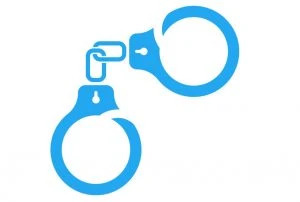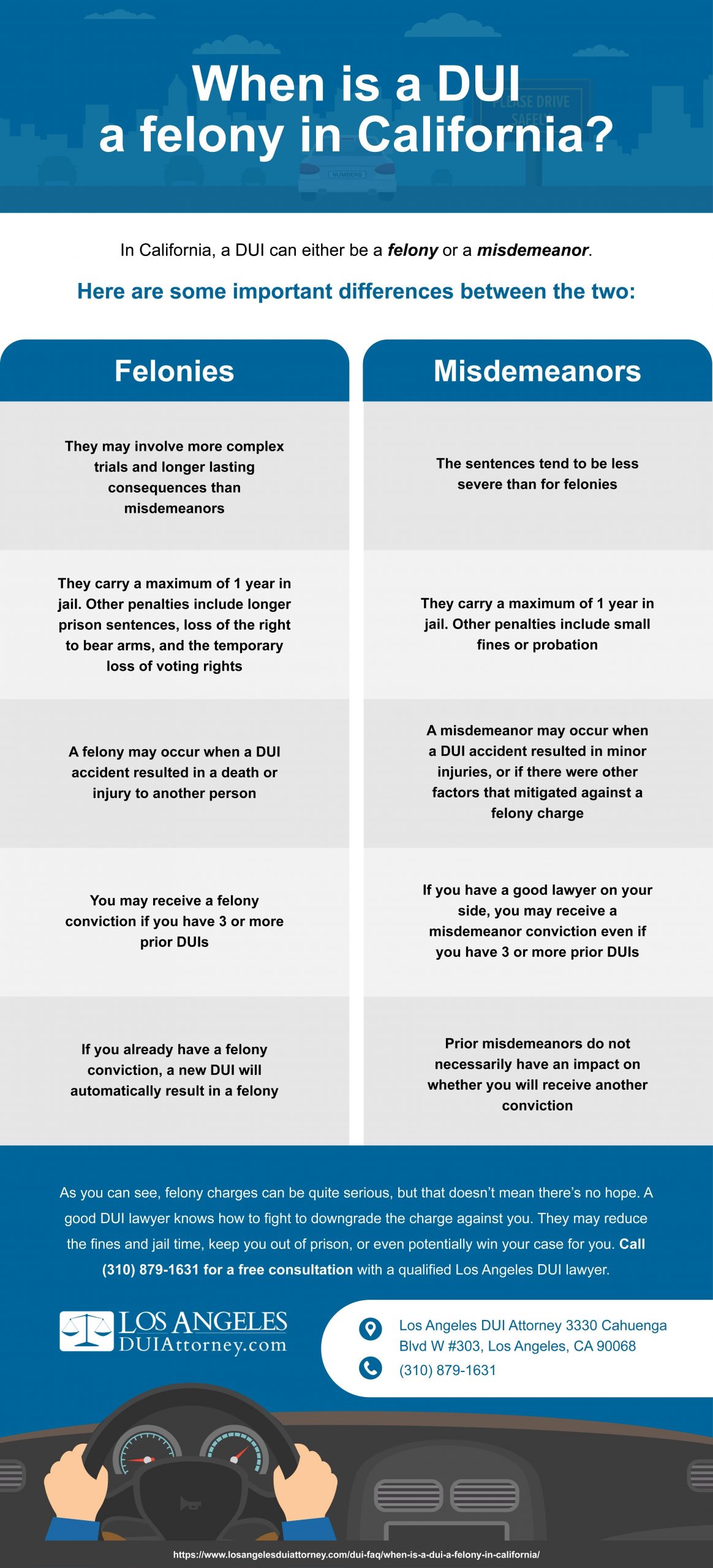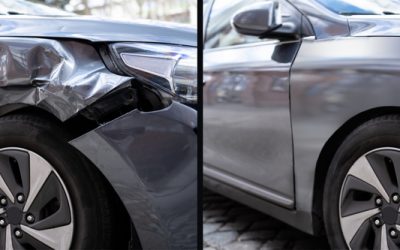
Felonies are the most serious kind of criminal charge, so you need to know when your DUI is a felony in California. The punishments for felony DUI conviction are much stronger than for misdemeanor DUI.
Your lawyer’s approach to your case will change depending on the charge you’re facing. But first, you should know the difference between the two types of DUI charges.
The Difference Between a Felony and a Misdemeanor
Felonies and misdemeanors are the two main types of criminal charges. In both kinds of cases, you have a right to an attorney to represent you, and you will face a trial by jury. Felonies, however, involve more complex trials and heavier penalties. They also have effects that last long after your case is over.
Misdemeanors
Misdemeanors carry a maximum of 1 year in jail, served in your local county jail. They may carry additional penalties, such as fines, typically $1,000 or less (the total fines and fees for a misdemeanor DUI can be much higher, however). Additionally, you may have to serve probation.
Felonies
Felonies carry a minimum of 1 year of jail time. They may carry a longer prison sentence, which is served in state prison. Fines are well in excess of $1,000, and often tens of thousands of dollars total for a DUI case. Your sentence may include parole as well as probation.
Additionally, felonies have long-term effects:
- Once convicted of a felony, you lose your right to bear arms. You cannot own firearms legally for the rest of your life.
- You cannot qualify for a hunting or fishing license if you are a convicted felon, and face limits for other types of licenses.
- You must disclose your felon status when you apply for jobs. Many industries will consider this sufficient reason not to hire you. This is legal for them to do.
- You temporarily lose your right to vote once convicted of a felony. You cannot vote in any election while you are serving your prison sentence, including parole. In California, once you are finished with prison/parole, you may once again register to vote (even if you’re still on probation).
Clearly, facing a felony DUI charge is much more serious, and costly, than a misdemeanor. So, how do you know which type of felony DUI you face?
Three Types of Felony DUIs in California
Whether a DUI counts as a felony depends on the situation. There are three situations where a DUI counts as a felony in California:
Someone Was Injured or Killed
If your DUI involved an accident where anyone was hurt, it could count as a felony. Prosecutors have the option to try your case as a misdemeanor instead, and may do so if the injuries were minor or if there were mitigating factors.
Three or More Prior DUIs
Once you hit your fourth DUI charge, they can try it as a felony. Note that certain other past charges, like “reckless driving” involving alcohol, will count as prior convictions even though they are less serious than DUI. Again, the prosecutor can choose to pursue a felony charge or not, and a good DUI lawyer may help reduce it to a misdemeanor DUI.
You Have a Prior Felony DUI Conviction
Regardless of the above factors, if you already have one or more felony DUIs on your record, your fresh charge will be a felony as well. Prosecutors cannot waive this. It will automatically proceed as a felony charge.
So, generally speaking, if this is your first DUI or similar charge, it’s only a felony if someone was hurt. In most other cases, only a fourth (or more) DUI is a felony. However, once you’ve been convicted of a felony DUI, all future DUIs will be felonies.
Beware of Watson Murder Charges
If someone was killed in a DUI crash with you and the prosecution thinks you acted with “implied malice,” you could get a charge of second-degree murder along with your DUI charge, even if it’s your first DUI conviction.
This is called a “Watson Murder” charge, named after a Supreme Court case in the 1980s. Any DUI case that involves a death should be treated like a felony case, even if the DUI ends up being treated as a misdemeanor. The second-degree murder charge is a felony and will override the lesser punishment of a misdemeanor.
What Will I Face With a Misdemeanor DUI Conviction?
Do not think that a misdemeanor DUI conviction is a lesser crime. While there is less jail time and you get to keep your rights, you will still face massive penalties, potentially including:
- License suspension or revocation
- Probation
- Use of an ignition interlocking device
- Forced attendance of driving school
- Forced attendance of rehabilitation classes or meetings
- Vehicle impounding
These extra burdens make misdemeanor DUIs very expensive, and you may also face some or all of these if you’re convicted of felony DUI. The repercussions of these financial penalties and limits to your freedom can set you back years.
How a Los Angeles DUI Lawyer Handles a Felony DUI
A felony DUI in California will never be an easy charge to face, but that doesn’t mean you have to lose your case. A good DUI lawyer knows how to fight to downgrade the charge against you. They may reduce the fines and jail time, keep you out of prison, or even potentially win your case for you.
Felony cases are complex. They involve multiple stages at which the charges can be disputed, and the defense has more time to prepare. These are opportunities that a good DUI lawyer will use to strengthen your case. They may be able to toss out evidence against you, find holes in the prosecution, and change the course of your life for years to come.
If you’ve been arrested for DUI, we can match you with a lawyer who’s right for your case – free. Fill out the form to your right to receive a 100% free consultation from a qualified Los Angeles DUI lawyer.







